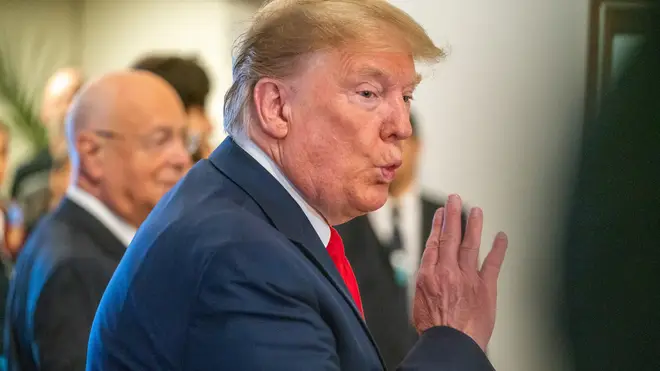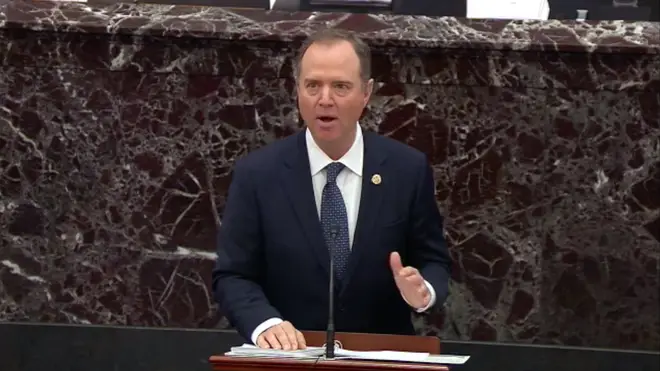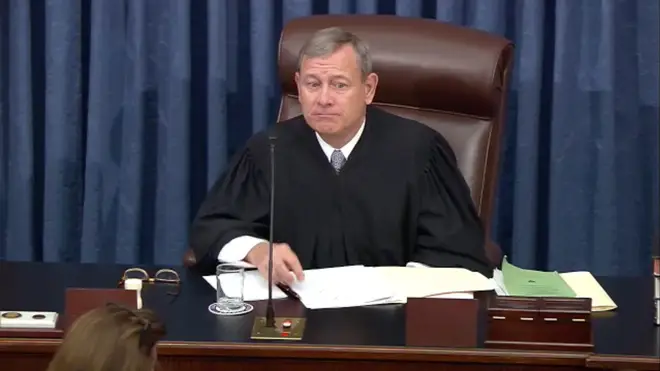
James O'Brien 10am - 1pm
22 January 2020, 22:22

House Democrats have opened arguments in Donald Trump's impeachment trial, pleading with Republicans to remove the president from office to "protect our democracy."
Representative Adam Schiff, the Democratic chairman of the House Intelligence Committee, appealed to senators not to be "cynical" about the politics of impeachment, asking them to draw on the intent of the nation's Founding Fathers who provided the remedy of impeachment.
The accusers have 24 hours over the next three days to prosecute the charges against Mr Trump.
They must win over both senators sitting in the chamber and the public, deeply divided over the president and his impeachment.
Mr Schiff said: “Over the coming days, we will present to you - and to the American people - the extensive evidence collected during the House's impeachment inquiry into the president's abuse of power.
WATCH PROCEEDINGS LIVE HERE

"You will hear their testimony at the same time as the American people. That is, if you will allow it."
Mr Trump's lawyers sat by, waiting their turn, while he blasted the proceedings from afar, threatening jokingly to face off with the Democrats by coming to "sit right in the front row and stare at their corrupt faces".
Democratic accusers say Mr Trump was the one with the "corrupt scheme" to abuse his presidential power and then obstruct Congress' investigation.
After the House prosecutors present their case, the president's lawyers will follow with another 24 hours over three days to mount a defence.
They are expected to take only Sunday off.
President Trump: "We have all the material. They don't have the material." pic.twitter.com/zu5UOgEUD9
— CSPAN (@cspan) January 22, 2020
Then there will be 16 hours for senators, who must sit quietly at their desks, no speeches or mobile phones, to ask written question, and another four hours for deliberations.
By the end of next week there is expected to be one last vote on whether or not they want to hear from more witnesses, and it appears increasingly likely that will be the end.
The proceedings are unfolding at the start of an election year and there are few signs that Republican are interested in calling more witnesses or going beyond a fast-track assessment to bring a quick vote on charges related to Mr Trump's dealings with Ukraine.
The trial marks just the third time the Senate has weighed whether an American president should be removed from office.
Democrats argue Mr Trump abused his office by asking Ukraine to investigate political rivals while withholding crucial military aid, and also obstructed Congress by refusing to turn over documents or allow officials to give evidence in the House probe.

Republicans have defended Mr Trump's actions and cast the process as a politically motivated effort to weaken the president in the midst of his re-election campaign.
A new poll from The Associated Press-NORC Centre for Public Affairs Research shows the public in favour of the Senate convicting and removing Mr Trump from office at 45 per cent to 40 per cent.
But there is wide agreement that Mr Trump should allow top aides to appear as witnesses at the trial.
About seven in 10 said so, including majorities of Republicans and Democrats, according to the poll.
The idea over witnesses, though, seems all but settled after wrangling over rules for the trial stretched late into the previous night, with Republicans shooting down one-by-one Democratic efforts to get Mr Trump's aides including former national security adviser John Bolton, secretary of state Mike Pompeo, and acting chief of staff Mick Mulvaney, to give evidence as witnesses.
Senators are likely to repeat those rejections next week, shutting out any chance of new evidence.
Chief Justice John Roberts opened Wednesday's session as senators settled in for the long days ahead.
Mr Trump, who was in Davos, Switzerland, attending a global economic forum, praised his legal team, and suggested he would be open to his advisers giving evidence, though that seems unlikely.
He said there were "national security" concerns that would stand in the way.